- Home
- Edith Wharton
The Valley of Decision
The Valley of Decision Read online
The Valley of Decision
Edith Wharton
The Project Gutenberg Etext of The Valley Of Decision, by Edith Wharton #10 in our series by Edith Wharton
Copyright laws are changing all over the world. Be sure to check the copyright laws for your country before distributing this or any other Project Gutenberg file.
We encourage you to keep this file, exactly as it is, on your own disk, thereby keeping an electronic path open for future readers. Please do not remove this.
This header should be the first thing seen when anyone starts to view the etext. Do not change or edit it without written permission.
The words are carefully chosen to provide users with the information they need to understand what they may and may not do with the etext.
**Welcome To The World of Free Plain Vanilla Electronic Texts**
**Etexts Readable By Both Humans and By Computers, Since 1971**
*****These Etexts Are Prepared By Thousands of Volunteers!*****
Information on contacting Project Gutenberg to get etexts, and further information, is included below. We need your donations.
The Project Gutenberg Literary Archive Foundation is a 501(c)(3) organization with EIN [Employee Identification Number] 64-6221541
Title: The Valley Of Decision
Author: Edith Wharton
Release Date: August, 2003 [Etext# 4327]
[Yes, we are more than one year ahead of schedule]
[This file was first posted on January 7, 2002]
Edition: 10
Language: English
Character set encoding: ASCII
The Project Gutenberg Etext of The Valley Of Decision, by Edith Wharton *********This file should be named vldcn10.txt or vldcn10.zip*********
Corrected EDITIONS of our etexts get a new NUMBER, vldcn11.txt VERSIONS based on separate sources get new LETTER, vldcn10a.txt Produced by Sue Asscher [email protected] Project Gutenberg Etexts are often created from several printed editions, all of which are confirmed as Public Domain in the US
unless a copyright notice is included. Thus, we usually do not keep etexts in compliance with any particular paper edition.
We are now trying to release all our etexts one year in advance of the official release dates, leaving time for better editing.
Please be encouraged to tell us about any error or corrections, even years after the official publication date.
Please note neither this listing nor its contents are final til midnight of the last day of the month of any such announcement.
The official release date of all Project Gutenberg Etexts is at Midnight, Central Time, of the last day of the stated month. A preliminary version may often be posted for suggestion, comment and editing by those who wish to do so.
Most people start at our sites at:
http://gutenberg.net or
http://promo.net/pg
These Web sites include award-winning information about Project Gutenberg, including how to donate, how to help produce our new etexts, and how to subscribe to our email newsletter (free!).
Those of you who want to download any Etext before announcement can get to them as follows, and just download by date. This is also a good way to get them instantly upon announcement, as the indexes our cataloguers produce obviously take a while after an announcement goes out in the Project Gutenberg Newsletter.
http://www.ibiblio.org/gutenberg/etext03 or ftp://ftp.ibiblio.org/pub/docs/books/gutenberg/etext03
Or /etext02, 01, 00, 99, 98, 97, 96, 95, 94, 93, 92, 92, 91 or 90
Just search by the first five letters of the filename you want, as it appears in our Newsletters.
Information about Project Gutenberg (one page) We produce about two million dollars for each hour we work. The time it takes us, a rather conservative estimate, is fifty hours to get any etext selected, entered, proofread, edited, copyright searched and analyzed, the copyright letters written, etc. Our projected audience is one hundred million readers. If the value per text is nominally estimated at one dollar then we produce $2
million dollars per hour in 2001 as we release over 50 new Etext files per month, or 500 more Etexts in 2000 for a total of 4000+
If they reach just 1-2% of the world’s population then the total should reach over 300 billion Etexts given away by year’s end.
The Goal of Project Gutenberg is to Give Away One Trillion Etext Files by December 31, 2001. [10,000 x 100,000,000 = 1 Trillion]
This is ten thousand titles each to one hundred million readers, which is only about 4% of the present number of computer users.
At our revised rates of production, we will reach only one-third of that goal by the end of 2001, or about 4,000 Etexts. We need funding, as well as continued efforts by volunteers, to maintain or increase our production and reach our goals.
The Project Gutenberg Literary Archive Foundation has been created to secure a future for Project Gutenberg into the next millennium.
We need your donations more than ever!
As of November, 2001, contributions are being solicited from people and organizations in: Alabama, Arkansas, Connecticut, Delaware, Florida, Georgia, Idaho, Illinois, Indiana, Iowa, Kansas, Kentucky, Louisiana, Maine, Michigan, Missouri, Montana, Nebraska, Nevada, New Jersey, New Mexico, New York, North Carolina, Oklahoma, Oregon, Pennsylvania, Rhode Island, South Carolina, South Dakota, Tennessee, Texas, Utah, Vermont, Virginia, Washington, West Virginia, Wisconsin, and Wyoming.
In Progress
We have filed in about 45 states now, but these are the only ones that have responded.
As the requirements for other states are met, additions to this list will be made and fund raising will begin in the additional states.
Please feel free to ask to check the status of your state.
In answer to various questions we have received on this: We are constantly working on finishing the paperwork to legally request donations in all 50 states. If your state is not listed and you would like to know if we have added it since the list you have, just ask.
While we cannot solicit donations from people in states where we are not yet registered, we know of no prohibition against accepting donations from donors in these states who approach us with an offer to donate.
International donations are accepted, but we don’t know ANYTHING about how to make them tax-deductible, or even if they CAN be made deductible, and don’t have the staff to handle it even if there are ways.
All donations should be made to:
Project Gutenberg Literary Archive Foundation PMB 113
1739 University Ave.
Oxford, MS 38655-4109
Contact us if you want to arrange for a wire transfer or payment method other than by check or money order.
The Project Gutenberg Literary Archive Foundation has been approved by the US Internal Revenue Service as a 501(c)(3) organization with EIN
[Employee Identification Number] 64-622154. Donations are tax-deductible to the maximum extent permitted by law. As fundraising requirements for other states are met, additions to this list will be made and fundraising will begin in the additional states.
We need your donations more than ever!
You can get up to date donation information at: http://www.gutenberg.net/donation.html **
If you can’t reach Project Gutenberg,
you can always email directly to:
Michael S. Hart
Prof. Hart will answer or forward your message.
We would prefer to send you information by email.
**The Legal Small Print**
(Three Pages)
***START**THE SMALL PRINT!**FOR PUBLIC DOMAIN ETEXTS**START***
Why is this “Small Print!” s
tatement here? You know: lawyers.
They tell us you might sue us if there is something wrong with your copy of this etext, even if you got it for free from someone other than us, and even if what’s wrong is not our fault. So, among other things, this “Small Print!” statement disclaims most of our liability to you. It also tells you how you may distribute copies of this etext if you want to.
BEFORE! YOU USE OR READ THIS ETEXT
By using or reading any part of this PROJECT GUTENBERG-tm etext, you indicate that you understand, agree to and accept this “Small Print!” statement. If you do not, you can receive a refund of the money (if any) you paid for this etext by sending a request within 30 days of receiving it to the person you got it from. If you received this etext on a physical medium (such as a disk), you must return it with your request.
ABOUT PROJECT GUTENBERG-TM ETEXTS
This PROJECT GUTENBERG-tm etext, like most PROJECT GUTENBERG-tm etexts, is a “public domain” work distributed by Professor Michael S. Hart through the Project Gutenberg Association (the “Project”).
Among other things, this means that no one owns a United States copyright on or for this work, so the Project (and you!) can copy and distribute it in the United States without permission and without paying copyright royalties. Special rules, set forth below, apply if you wish to copy and distribute this etext under the “PROJECT GUTENBERG” trademark.
Please do not use the “PROJECT GUTENBERG” trademark to market any commercial products without permission.
To create these etexts, the Project expends considerable efforts to identify, transcribe and proofread public domain works. Despite these efforts, the Project’s etexts and any medium they may be on may contain “Defects”. Among other things, Defects may take the form of incomplete, inaccurate or corrupt data, transcription errors, a copyright or other intellectual property infringement, a defective or damaged disk or other etext medium, a computer virus, or computer codes that damage or cannot be read by your equipment.
LIMITED WARRANTY; DISCLAIMER OF DAMAGES
But for the “Right of Replacement or Refund” described below, [1] Michael Hart and the Foundation (and any other party you may receive this etext from as a PROJECT GUTENBERG-tm etext) disclaims all liability to you for damages, costs and expenses, including legal fees, and [2] YOU HAVE NO REMEDIES FOR NEGLIGENCE OR
UNDER STRICT LIABILITY, OR FOR BREACH OF WARRANTY OR CONTRACT, INCLUDING BUT NOT LIMITED TO INDIRECT, CONSEQUENTIAL, PUNITIVE
OR INCIDENTAL DAMAGES, EVEN IF YOU GIVE NOTICE OF THE
POSSIBILITY OF SUCH DAMAGES.
If you discover a Defect in this etext within 90 days of receiving it, you can receive a refund of the money (if any) you paid for it by sending an explanatory note within that time to the person you received it from. If you received it on a physical medium, you must return it with your note, and such person may choose to alternatively give you a replacement copy. If you received it electronically, such person may choose to alternatively give you a second opportunity to receive it electronically.
THIS ETEXT IS OTHERWISE PROVIDED TO YOU “AS-IS”. NO OTHER
WARRANTIES OF ANY KIND, EXPRESS OR IMPLIED, ARE MADE TO YOU AS
TO THE ETEXT OR ANY MEDIUM IT MAY BE ON, INCLUDING BUT NOT
LIMITED TO WARRANTIES OF MERCHANTABILITY OR FITNESS FOR A PARTICULAR PURPOSE.
Some states do not allow disclaimers of implied warranties or the exclusion or limitation of consequential damages, so the above disclaimers and exclusions may not apply to you, and you may have other legal rights.
INDEMNITY
You will indemnify and hold Michael Hart, the Foundation, and its trustees and agents, and any volunteers associated with the production and distribution of Project Gutenberg-tm texts harmless, from all liability, cost and expense, including legal fees, that arise directly or indirectly from any of the following that you do or cause: [1] distribution of this etext, [2] alteration, modification, or addition to the etext, or [3] any Defect.
DISTRIBUTION UNDER “PROJECT GUTENBERG-tm”
You may distribute copies of this etext electronically, or by disk, book or any other medium if you either delete this “Small Print!” and all other references to Project Gutenberg, or:
[1] Only give exact copies of it. Among other things, this requires that you do not remove, alter or modify the etext or this “small print!” statement. You may however, if you wish, distribute this etext in machine readable binary, compressed, mark-up, or proprietary form, including any form resulting from conversion by word processing or hypertext software, but only so long as EITHER:
[*] The etext, when displayed, is clearly readable, and does not contain characters other than those intended by the author of the work, although tilde (~), asterisk (*) and underline (_) characters may be used to convey punctuation intended by the author, and additional characters may be used to indicate hypertext links; OR
[*] The etext may be readily converted by the reader at no expense into plain ASCII, EBCDIC or equivalent form by the program that displays the etext (as is the case, for instance, with most word processors); OR
[*] You provide, or agree to also provide on request at no additional cost, fee or expense, a copy of the etext in its original plain ASCII form (or in EBCDIC
or other equivalent proprietary form).
[2] Honor the etext refund and replacement provisions of this “Small Print!” statement.
[3] Pay a trademark license fee to the Foundation of 20% of the gross profits you derive calculated using the method you already use to calculate your applicable taxes. If you don’t derive profits, no royalty is due. Royalties are payable to “Project Gutenberg Literary Archive Foundation”
the 60 days following each date you prepare (or were legally required to prepare) your annual (or equivalent periodic) tax return. Please contact us beforehand to let us know your plans and to work out the details.
WHAT IF YOU WANT TO SEND MONEY EVEN IF YOU DON’T HAVE TO?
Project Gutenberg is dedicated to increasing the number of public domain and licensed works that can be freely distributed in machine readable form.
The Project gratefully accepts contributions of money, time, public domain materials, or royalty free copyright licenses.
Money should be paid to the:
“Project Gutenberg Literary Archive Foundation.”
If you are interested in contributing scanning equipment or software or other items, please contact Michael Hart at: [email protected]
[Portions of this header are copyright (C) 2001 by Michael S. Hart and may be reprinted only when these Etexts are free of all fees.]
[Project Gutenberg is a TradeMark and may not be used in any sales of Project Gutenberg Etexts or other materials be they hardware or software or any other related product without express permission.]
END THE SMALL PRINT! FOR PUBLIC DOMAIN ETEXTSVer.10/04/01*END*
Produced by Sue Asscher [email protected]
THE VALLEY OF DECISION
BY
EDITH WHARTON
Author of “A Gift from the Grave,” “Crucial Instances,” etc.
“Multitudes, multitudes in the valley of decision.”
TO
MY FRIENDS
PAUL AND MINNIE BOURGET
IN REMEMBRANCE OF
ITALIAN DAYS TOGETHER.
CONTENTS.
BOOK I. THE OLD ORDER.
BOOK II. THE NEW LIGHT.
BOOK III. THE CHOICE.
BOOK IV. THE REWARD.
BOOK I.
THE OLD ORDER.
Prima che incontro alla festosa fronte I lugubri suoi lampi il ver baleni.
1.1.
It was very still in the small neglected chapel. The noises of the farm came faintly through closed doors—voices shouting at the oxen in the lower fields, the querulous bark of the old house-dog, and Filomena’s angry calls to the little white-faced foundling in the kitchen.
The February day was closing, and
a ray of sunshine, slanting through a slit in the chapel wall, brought out the vision of a pale haloed head floating against the dusky background of the chancel like a water-lily on its leaf. The face was that of the saint of Assisi—a sunken ravaged countenance, lit with an ecstasy of suffering that seemed not so much to reflect the anguish of the Christ at whose feet the saint knelt, as the mute pain of all poor down-trodden folk on earth.
When the small Odo Valsecca—the only frequenter of the chapel—had been taunted by the farmer’s wife for being a beggar’s brat, or when his ears were tingling from the heavy hand of the farmer’s son, he found a melancholy kinship in that suffering face; but since he had fighting blood in him too, coming on the mother’s side of the rude Piedmontese stock of the Marquesses di Donnaz, there were other moods when he turned instead to the stout Saint George in gold armour, just discernible through the grime and dust of the opposite wall.
The chapel of Pontesordo was indeed as wonderful a storybook as fate ever unrolled before the eyes of a neglected and solitary child. For a hundred years or more Pontesordo, a fortified manor of the Dukes of Pianura, had been used as a farmhouse; and the chapel was never opened save when, on Easter Sunday, a priest came from the town to say mass. At other times it stood abandoned, cobwebs curtaining the narrow windows, farm tools leaning against the walls, and the dust deep on the sea-gods and acanthus volutes of the altar. The manor of Pontesordo was very old.
The country people said that the great warlock Virgil, whose dwelling-place was at Mantua, had once shut himself up for a year in the topmost chamber of the keep, engaged in unholy researches; and another legend related that Alda, wife of an early lord of Pianura, had thrown herself from its battlements to escape the pursuit of the terrible Ezzelino. The chapel adjoined this keep, and Filomena, the farmer’s wife, told Odo that it was even older than the tower and that the walls had been painted by early martyrs who had concealed themselves there from the persecutions of the pagan emperors.
On such questions a child of Odo’s age could obviously have no pronounced opinion, the less so as Filomena’s facts varied according to the seasons or her mood, so that on a day of east wind or when the worms were not hatching well, she had been known to affirm that the pagans had painted the chapel under Virgil’s instruction, to commemorate the Christians they had tortured. In spite of the distance to which these conflicting statements seemed to relegate them, Odo somehow felt as though these pale strange people—youths with ardent faces under their small round caps, damsels with wheat-coloured hair and boys no bigger than himself, holding spotted dogs in leash—were younger and nearer to him than the dwellers on the farm: Jacopone the farmer, the shrill Filomena, who was Odo’s foster-mother, the hulking bully their son and the abate who once a week came out from Pianura to give Odo religious instruction and who dismissed his questions with the invariable exhortation not to pry into matters that were beyond his years. Odo had loved the pictures in the chapel all the better since the abate, with a shrug, had told him they were nothing but old rubbish, the work of the barbarians.

 The Age of Innocence
The Age of Innocence The Reef
The Reef Summer
Summer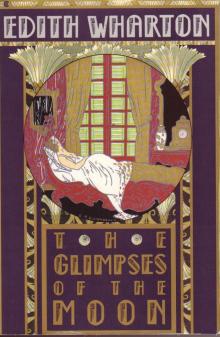 The Glimpses of the Moon
The Glimpses of the Moon Xingu
Xingu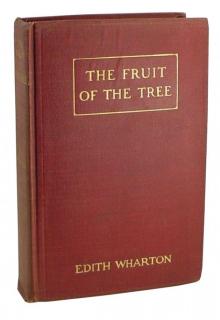 The Fruit of the Tree
The Fruit of the Tree Fast and Loose
Fast and Loose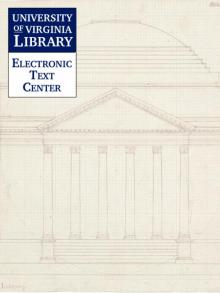 Artemis to Actaeon and Other Verse
Artemis to Actaeon and Other Verse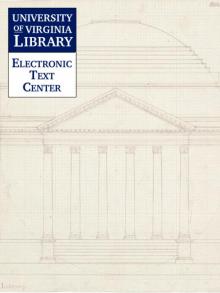 The Line of Least Resistance
The Line of Least Resistance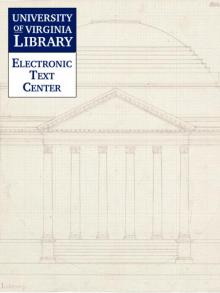 The Lamp of Psyche
The Lamp of Psyche The Reckoning
The Reckoning Afterward
Afterward The New York Stories of Edith Wharton
The New York Stories of Edith Wharton The 2014 Halloween Horrors Megapack
The 2014 Halloween Horrors Megapack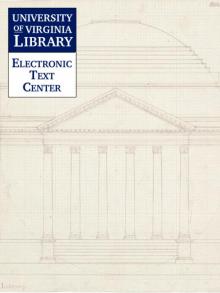 'Copy': A Dialogue
'Copy': A Dialogue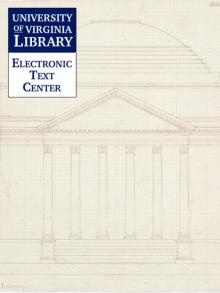 The Recovery
The Recovery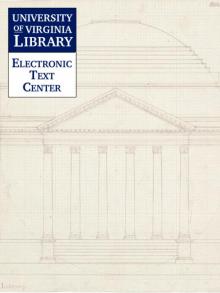 The Fulness of Life
The Fulness of Life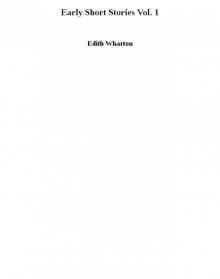 Early Short Stories Vol. 1
Early Short Stories Vol. 1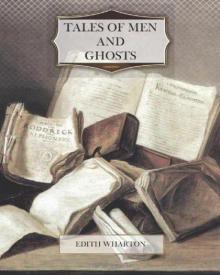 Tales of Men and Ghosts
Tales of Men and Ghosts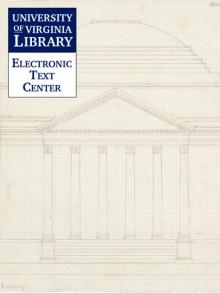 The House of the Dead Hand
The House of the Dead Hand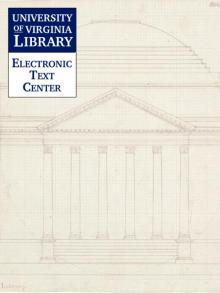 That Good May Come
That Good May Come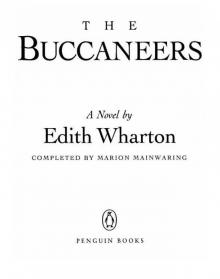 The Buccaneers
The Buccaneers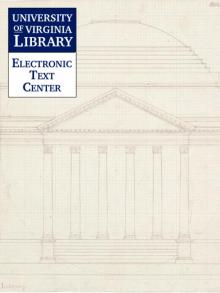 Other Times, Other Manners
Other Times, Other Manners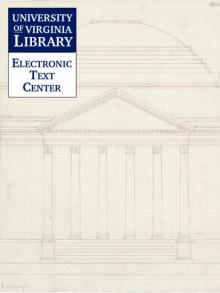 The Hermit and the Wild Woman
The Hermit and the Wild Woman Kerfol
Kerfol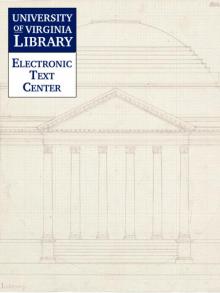 The Duchess at Prayer
The Duchess at Prayer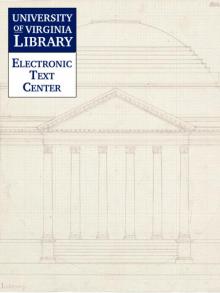 Bunner Sisters
Bunner Sisters The Choice
The Choice Madame De Treymes
Madame De Treymes Ethan Frome, Summer, Bunner Sisters
Ethan Frome, Summer, Bunner Sisters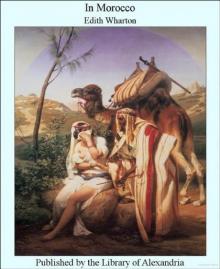 In Morocco
In Morocco The Valley of Decision
The Valley of Decision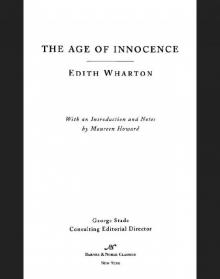 Age of Innocence (Barnes & Noble Classics Series)
Age of Innocence (Barnes & Noble Classics Series)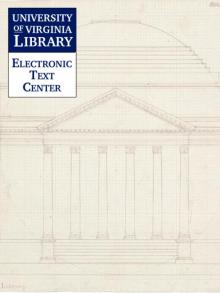 The Angel at the Grave
The Angel at the Grave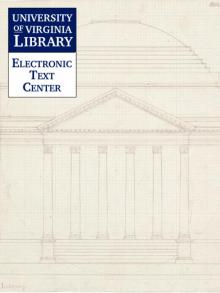 April Showers
April Showers Sanctuary
Sanctuary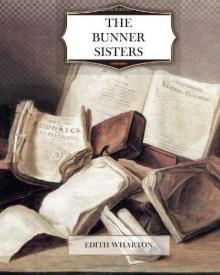 The Bunner Sisters
The Bunner Sisters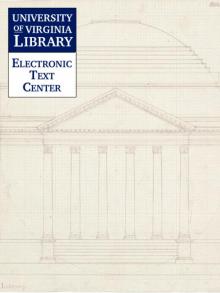 Mrs. Manstey's View
Mrs. Manstey's View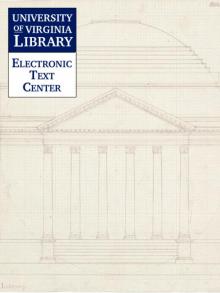 Writing a War Story
Writing a War Story The Custom of the Country
The Custom of the Country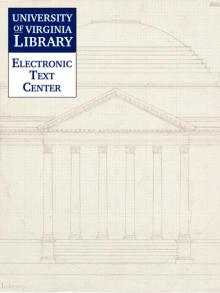 In Trust
In Trust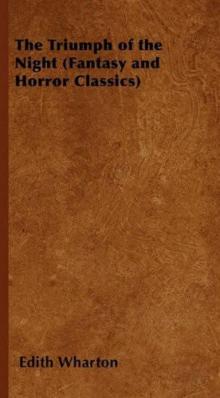 The Triumph of the Night
The Triumph of the Night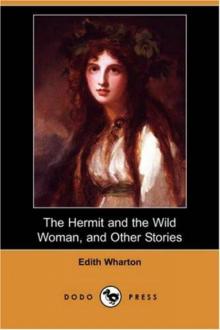 The Hermit and the Wild Woman, and Other Stories
The Hermit and the Wild Woman, and Other Stories Roman Fever and Other Stories
Roman Fever and Other Stories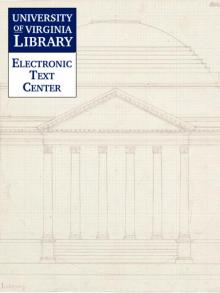 The Mission of Jane
The Mission of Jane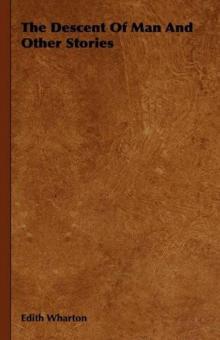 The Descent of Man and Other Stories
The Descent of Man and Other Stories Coming Home
Coming Home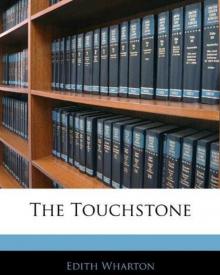 The Touchstone
The Touchstone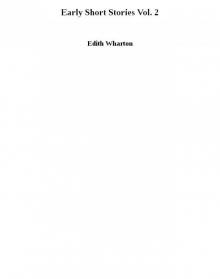 Early Short Stories Vol. 2
Early Short Stories Vol. 2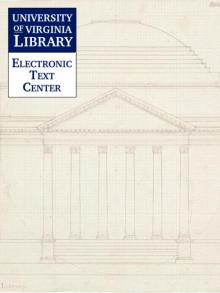 Edith Wharton's Verse, 1879-1919, from various journals.
Edith Wharton's Verse, 1879-1919, from various journals.